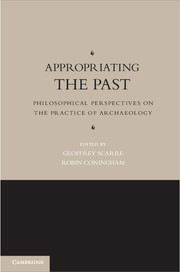Book contents
- Frontmatter
- Contents
- Contributors
- Editors
- Chapter 1 Introduction
- Part One Claiming the Past
- Part Two Problems of Meaning and Method
- Chapter 8 What Is a Crisis of Intelligibility?
- Chapter 9 Contesting Religious Claims over Archaeological Sites
- Chapter 10 Multivocality and “Wikiality”
- Chapter 11 “Do not do unto others…”
- Chapter 12 Should Ruins Be Preserved?
- Part Three Problems of Ownership and Control
- References
- Index
- References
Chapter 11 - “Do not do unto others…”
Cultural Misrecognition and the Harms of Appropriation in an Open-Source World
Published online by Cambridge University Press: 05 December 2012
- Frontmatter
- Contents
- Contributors
- Editors
- Chapter 1 Introduction
- Part One Claiming the Past
- Part Two Problems of Meaning and Method
- Chapter 8 What Is a Crisis of Intelligibility?
- Chapter 9 Contesting Religious Claims over Archaeological Sites
- Chapter 10 Multivocality and “Wikiality”
- Chapter 11 “Do not do unto others…”
- Chapter 12 Should Ruins Be Preserved?
- Part Three Problems of Ownership and Control
- References
- Index
- References
Summary
Human societies have a long history of incorporating elements of the past into the present; never has this been the case more than today. For centuries, if not millennia, creative artists and writers, architects and fashion designers, publicists and advertisers, have borrowed freely from the tangible and intangible heritage of other times and places (Figure 11.1). There is plentiful evidence of how fundamentally human achievement has depended on the transmission of knowledge across cultures. The technologies that shape our world are a case in point. Consider just one example: concrete, a technology we think of as distinctively modern – literally the building block of twenty-first-century society – was developed by both the Egyptians and the Romans thousands of years ago. In the context of increasingly rapid and global diffusion of tradition-specific images, ideas, and material culture, it is often a default assumption that ancient objects and images are elements of a shared legacy of humanity.
In this spirit, a growing contingent of scholars and activists aggressively defends the free flow of ideas, images, and knowledge – within and between societies, ancient and modern – on grounds that this is essential to innovation and creativity. Proponents of the Open Access and A2K (Access to Knowledge) movements speak of the importance of sharing the world's vast knowledge, whereas scholars such as Laurence Lessig, James Boyle, and Kembow McLeod (among others) point to the stifling effects of restrictions on open exchange. Frequently, the advocates of open access draw attention to benefits that flow to the source communities and cultures (or their descendants), as well as to the recipients who draw inspiration from the cultural heritage of others. Even if economic benefits don't flow equitably, so the argument goes, the open exchange of tradition-specific objects, practices, ideas, and knowledge may play an ambassadorial role, fostering cross-cultural understanding and respect.
- Type
- Chapter
- Information
- Appropriating the PastPhilosophical Perspectives on the Practice of Archaeology, pp. 195 - 221Publisher: Cambridge University PressPrint publication year: 2012
References
- 11
- Cited by



